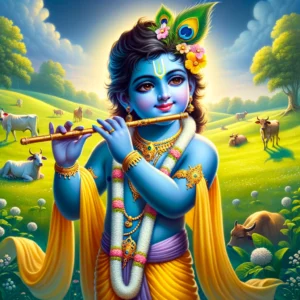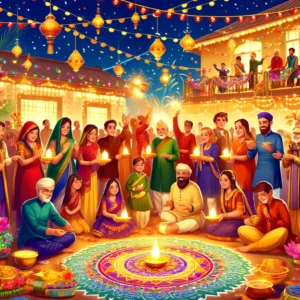Introduction to Hindu Religion

Hinduism, a multifaceted religion with ancient roots, shapes the lives and values of millions worldwide. It is not only a spiritual doctrine but also a way of life that integrates a variety of rituals, prayers, and moral codes designed to guide individuals towards a fulfilling life. The religion is unique in that it is a mosaic of diverse beliefs and practices yet unified by a common philosophical framework. From the grand epics and intricate rituals to its philosophical treatises, Hinduism offers a profound understanding of human existence and the universe.
Why Learn Hindu Religion?
Learning about Hinduism is not just an academic pursuit; it is a journey towards self-realization. It provides profound insights into the nature of existence and helps individuals understand their place in the world. Furthermore, studying Hindu religion encourages the inculcation of cultural values such as respect for elders and community cohesion. These values are essential for fostering harmonious relationships within families and societies.
In a nutshell, Studying Hinduism offers multiple layers of benefits, both spiritual and practical:
Cultural Appreciation: Hinduism is deeply interwoven with the cultural and historical fabric of India and other parts of Asia. Understanding Hinduism can deepen one’s appreciation and respect for its rich traditions and vibrant festivals.
Philosophical Insight: Hindu philosophy offers extensive teachings on the nature of reality, consciousness, and the universe, which can provide significant intellectual stimulation and personal insight.
Ethical Living: Hindu texts emphasize dharma (righteous living), which can guide individuals in making ethical decisions and leading a life that is harmonious with the world around them.
Spiritual Growth: The diverse practices within Hinduism, including meditation and yoga, aim at spiritual development, offering pathways to personal tranquility and enlightenment.
Community and Belonging: Learning about Hinduism can help foster a sense of community and belonging, as it encourages values of kinship, respect, and mutual support.

Our Features
-
Expert Tutors From India
Noble Learners has a team of expert tutors who are well-qualified and have a lot of experience. They are teaching many students in the US and are experts in the US Syllabus. Best Online Tutoring for USA from India.
-
One-One-Tutoring
Noble Learners believe in personal attention for every student. Every student needs a personal mentor who can help them to achieve their goals. With Noble Learners many students have achieved their dreams by scoring good grades in exams.
-
Flexible Timings
We provide flexible timings for our students, they can choose a slot as per their availability. Our tutors will be ready to take classes at that time.
-
Live Sessions Via Zoom
We believe in one-to-one live sessions for each of my students. Like others, we do not make and offer a pre-recorded course. We believe that students have the right to solve their doubts at the same time. Our Maths Tutors from India for the USA are highly professional and knowledgeable, who take every doubt of a student into account and try to solve them.
-
Free Demo (30-Minutes)
Every student has the right to decide before joining any tutoring as this is one of the most important decisions of their life. A good tutor at present can shape your future in higher education. Deciding a tutor is not an easy task, it is as important as opting for health insurance in the US. We give you the right to determine. Before starting your tutoring journey with us, you can take a free demo for 30 minutes.
-
More than 50 teachers to choose from
We believe in the availability of options, our platform has more than 50 tutors to choose from. We try our best to offer a perfect match to every student as per their requirement. However, if one is not satisfied with the demo, one can take another demo from another expert. It should be noted that only two demos are free and one has to pay for other demo classes.
Hindu Religion Syllabus
Our syllabus is carefully curated to cover the breadth and depth of Hindu philosophy and practice:
Bhagavad Gita: Study the dialogues between Prince Arjuna and Lord Krishna, which serve as a spiritual guidebook.
Teachings of the Vedas: Explore Rigveda, Yajurveda, Samaveda, and Atharvaveda, which cover everything from hymns of praise to rituals for daily living.
Teachings of the Upanishads: Investigate the metaphysical discussions that explore the concepts of the self and ultimate reality.
Ramayana and Mahabharata: Examine these epic narratives that offer moral lessons through rich storytelling.
Hindu Festivals and Their Significance: Understand the cultural importance of Diwali, Holi, Navaratri, and other festivals.
Meditation Techniques: Learn various forms of meditation that focus on developing concentration, emotional positivity, and a heightened state of awareness.
Yoga Practices: Engage with different types of Yoga, including Hatha Yoga, Bhakti Yoga, and Karma Yoga, to enhance spiritual connection and physical well-being.
Art of Happiness During Problems: Explore how Hindu teachings help maintain peace and happiness even in the face of life’s challenges.
Dharma and Ethics: Discuss the concept of dharma as duty, morality, and the rightful path in life’s various roles and situations.

Who can Join our Tutoring Classes?
Our comprehensive online tutoring classes are designed to make the rich teachings of Hinduism accessible to everyone, from beginners to those looking to deepen their existing knowledge. Join us to explore this ancient religion that offers timeless wisdom applicable to contemporary life challenges.
Hindu Religion Quiz
1. In the Bhagavad Gita, who is Arjuna's charioteer and spiritual guide?
a) Lord Shiva
b) Lord Rama
c) Lord Krishna
d) Lord Brahma
Correct Answer: c) Lord Krishna
2. Which Veda is known primarily for its hymns dedicated to various deities?
a) Yajurveda
b) Rigveda
c) Samaveda
d) Atharvaveda
Correct Answer: b) Rigveda
3. The Upanishads are a part of which body of ancient texts?
a) Smriti
b) Shruti
c) Puranas
d) Itihasas
Correct Answer: b) Shruti
4. Which epic features the discourse of the Bhagavad Gita?
a) Ramayana
b) Mahabharata
c) Puranas
d) Vedas
Correct Answer: b) Mahabharata
5. Diwali, the Festival of Lights, primarily celebrates:
a) The return of Lord Rama to Ayodhya
b) The victory of Lord Krishna over Narakasura
c) The creation of the universe
d) Both a and b
Correct Answer: d) Both a and b
6. What is the focus of meditation in Hindu practices?
a) Developing intellectual understanding
b) Achieving professional success
c) Developing concentration and emotional positivity
d) Perfecting physical strength
Correct Answer: c) Developing concentration and emotional positivity
7. Which type of yoga is primarily concerned with the devotion and surrender to a personal god?
a) Hatha Yoga
b) Bhakti Yoga
c) Karma Yoga
d) Raja Yoga
Correct Answer: b) Bhakti Yoga
8. In Hindu philosophy, what does Dharma refer to?
a) Ritual practices
b) Ultimate reality
c) Duty and righteousness
d) Meditation techniques
Correct Answer: c) Duty and righteousness
9. Which text is regarded as an important smriti scripture that discusses dharma, artha, kama, and moksha?
a) Vedas
b) Upanishads
c) Mahabharata
d) Manusmriti
Correct Answer: d) Manusmriti
10. Holi, the festival of colors, signifies:
a) The start of spring
b) The victory of good over evil
c) Love for Lord Krishna
d) All of the above
Correct Answer: d) All of the above
